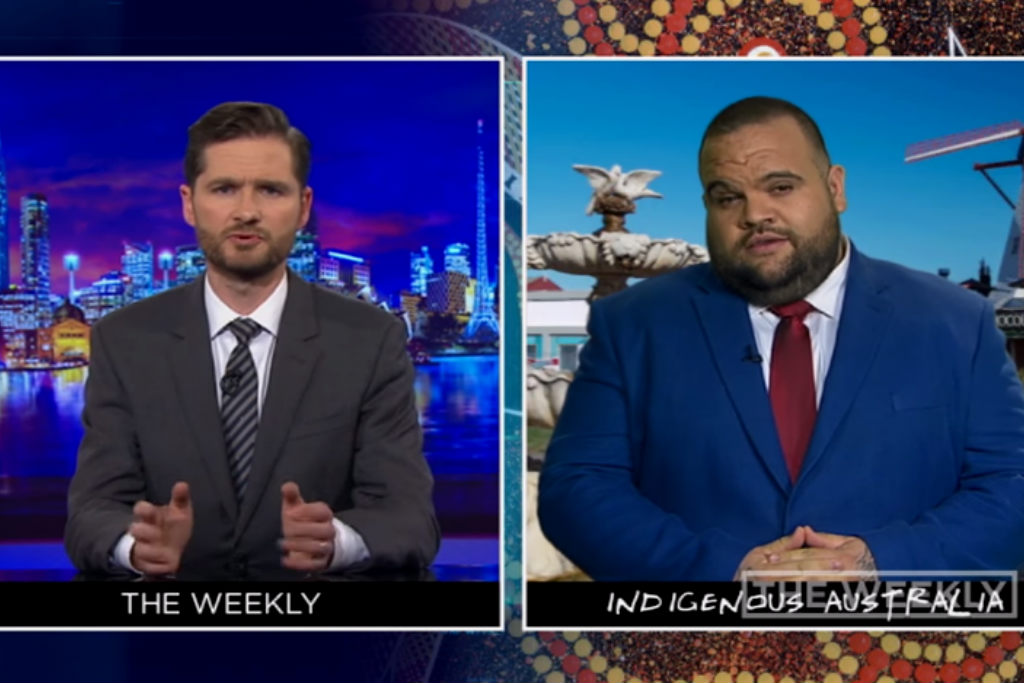Charlie Pickering And Adam Briggs Poke Holes In The “Need” For Constitutional Recognition On ‘The Weekly’
Constitutional recognition isn't the slam-dunk Parliament would like you to think it is.

On paper, holding a referendum to insert recognition of Australia’s Aboriginal and Torres Strait Islander peoples into the Constitution is a no-brainer. There’s bipartisan support for it, there are a number of blatantly racist provisions in the existing Constitution that deserve to get the boot, and updating Australia’s highest legal document to at least mention the people who’ve lived here for at least 40,000 years just seems like a decent thing to do.
But it’s not that simple; there are a host of real-world problems that could mean recognition never happens, or that it won’t mean much if it does. Sitting down with Weekly host Charlie Pickering last night, Yorta Yorta man, rapper and actor Adam Briggs outlined the various flaws and shortcomings of the RECOGNISE campaign that many Australians might not be aware of.
The Weekly‘s segment is a good introduction, but it only scratches the surface of why recognition isn’t the panacea for Aboriginal and Torres Strait Islander people it’s being sold as. For years, the political discussion around recognition has been vague and non-committal; John Howard and Kevin Rudd were promising a referendum on the issue way back in 2007, and nothing much has happened since. There’s still no agreement, or even any real signs of one, on what form that recognition would take.
Most importantly, consistent high-profile support for the federally-funded RECOGNISE campaign has obscured a very important fact: plenty of Aboriginal and Torres Strait Islander people don’t actually want constitutional recognition. An online poll run by IndigneousX founder Luke Pearson in July found that just 25 percent of respondents supported recognition, while more than 58 percent opposed it. Arrernte woman Celeste Liddle argues that the media fixation on the RECOGNISE campaign is stifling debate we should be having about more meaningful reforms, like whether Australia should enter into a legally binding treaty with its Aboriginal and Torres Strait Islander peoples.
That’s a shame, because the arguments for treaty and sovereignty, as opposed to largely symbolic reforms like recognition, are powerful and deserve to be heard. New Zealand, Canada and the United States have treaties of some description with their original inhabitants, but Australia doesn’t. Bob Hawke promised a treaty with Indigenous Australians back in 1988, but that was the last time a senior federal political figure seriously raised the idea.
Many Aboriginal and Torres Strait Islander people have been fighting for treaty and sovereignty rights for decades — earlier this week, Liya-dhälinymirr Djambarrpuyngu man Yingiya Mark Guyula started a national tour to raise awareness of the need for Aboriginal Australia to be given sovereignty and the legal means to negotiate terms for themselves. Last month, a meeting with 500 First Nations representatives in Victoria ended with a demand for the Victorian government to begin the process of negotiating a treaty instead of going with the federal proposal for recognition.
Sadly, much of that debate and resistance is happening under the popular radar. If places like The Weekly are beginning to question the dominant narrative on recognition and ask serious some questions, that can only be a good thing.